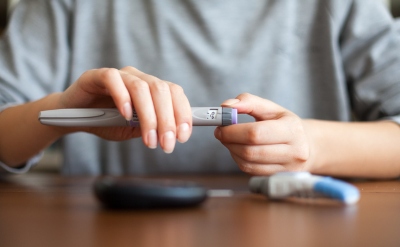Glucose-regulating medications used to treat obesity and type-2 diabetes may improve outcomes in COVID-19 patients with type-2 diabetes, a multinational retrospective cohort study suggests.
"The most important finding of this study for clinicians is the highly protective effect of glucagon-like peptide-1 receptor (GLP-1R) agonist treatment against mortality in patients with type 2 diabetes mellitus (T2DM)," said senior author Dr. Patricia Sue Grigson of Penn State College of Medicine in Hershey, Pennsylvania.
"Given this finding, and the safe profile of these medications, the data suggest that GLP-1 agonists should be given strong consideration as a treatment strategy for this vulnerable patient population," she told Reuters Health by email.

She and her Penn State team analyzed the electronic medical records of almost 30,000 de-identified patients treated at 56 healthcare organizations, mainly in the United States. The patients had type-2 diabetes and had tested positive for SARS-CoV-2 between January and September 2020.
The researchers investigated whether patients who were taking GLP-1R agonists, other diabetes medications, or both, six months or less before being diagnosed with COVID-19 had better outcomes than almost 24,000 similar patients who were not taking these medications.
As reported in the journal Diabetes, there were significantly fewer hospital admissions among patients taking versus not taking GLP-1R agonists (15.7% vs. 23.5%; risk ratio, 0.67; P<0.001) and pioglitazone (20.0% vs. 28.2%; RR, 0.71; P=0.01). Treatment with GLP-1R agonists was also linked with fewer respiratory complications (15.3% vs. 24.9%; RR, 0.62; P<0.001) and decreased mortality (1.9% vs. 3.3%; RR, 0.58; P=0.04).
Treatment with dipeptidyl peptidase-4 (DPP-4) inhibitors was linked with fewer respiratory complications (24.0% vs. 29.2%; RR, 0.82; P<0.001). Patients who continued to use DPP-4 inhibitors after hospitalization had fewer deaths than those who discontinued their use (9% vs. 19%; RR, 0.45; P<0.001). Pioglitazone use showed decreased risk of hospital admission, but neither DPP-4 nor pioglitazone showed decreased risk of death.
"It was important to conduct this study because patients with T2DM are at very high risk of death from COVID-19," Dr. Grigson explained. "As such, it is critical that we identify treatment strategies that may be protective."
"Although this retrospective study cannot show cause and effect," she added, "the results suggest that treatment of patients with T2DM with GLP-1R agonists will lead to greater resilience and greater survival following a diagnosis with COVID-19."
Co-lead author Dr. Nazia T. Raja-Khan cautioned in an email, "We looked at the use of GLP-1R agonists within six months prior to COVID-19 diagnosis, not their initiation at the time of COVID-19 diagnosis. There is no evidence that starting GLP-1R agonist treatment for the first time during the acute management of COVID-19 is safe or effective."
Co-lead author Dr. Jennifer E. Nyland noted that using a worldwide database that is continuously being updated is a weakness and an asset. "The research is constantly evolving at a rapid rate," she told Reuters Health by email.
She observed that the findings "leave a plethora of unanswered questions such as, 'How does duration of treatment or duration of disease affect outcomes?'"
"With this ever-changing landscape, it's impressive how the medical and research communities have come together and eliminated barriers to save lives," Dr. Nyland added.
The authors, who report no conflicts of interest, call for related randomized clinical trials.
The study did not receive commercial funding.
SOURCE: https://bit.ly/3ltIXYa Diabetes, online September 27, 2021.
Photo Credit: Getty Images
